| Srl | Item |
| 1 |
ID:
129887
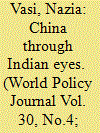

|
|
|
| 2 |
ID:
189854
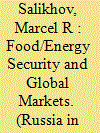

|
|
|
|
|
| Summary/Abstract |
Current geopolitical divisions are causing global markets to stop
functioning normally. Markets themselves have become fragmented,
supply chains are more unsafe, and incentives to invest in and expand
production have weakened.
|
|
|
|
|
|
|
|
|
|
|
|
|
|
|
|
| 3 |
ID:
138602
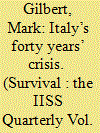

|
|
|
|
|
| Summary/Abstract |
The era of Silvio Berlusconi is over. Italy will never again be represented on the world stage by an ageing businessman with a turbulent private life, a criminal record and pariah status among other European leaders. Power has passed into the hands of a kinetic young man with a pudding-bowl haircut, Matteo Renzi, whose self-proclaimed mission is to rottamare (junk) the old guard in Italian politics and to revive the country’s institutions and economy.
|
|
|
|
|
|
|
|
|
|
|
|
|
|
|
|
| 4 |
ID:
114709
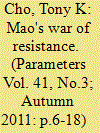

|
|
|
| 5 |
ID:
131780
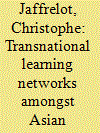

|
|
|
|
|
| Publication |
2014.
|
| Summary/Abstract |
The students of transnational flows, including James Rosenau,1 have pertinently highlighted the growing assertion of 'sovereign free actors' at the expense of 'sovereign bound actors' in what they call postinternational politics.2 Dealing mostly with the end of the Cold War era, they have tended to focus on the increasingly important role of not only the multinational firms but also of the financial companies on newly globalized markets, and not only law-abiding but also illicit traffickers (of drugs, arms etc.) which have prospered along with increasingly more effective means of communication.
They have almost completely ignored the transnationalization of religions, except from the point of view of fundamentalisms and related terrorist networks. Sociologists have paid more attention to this development.3 But these studies, which have mostly focused on the impact of migrations,4 have tended to under estimate the resilience of state boundaries5 and have often neglected the circulation of ideas, especially from the point of view of the learning networks-the very object of this Special Issue which concentrates on one particular creed: Islam.
|
|
|
|
|
|
|
|
|
|
|
|
|
|
|
|